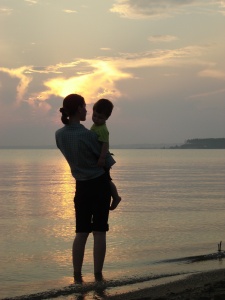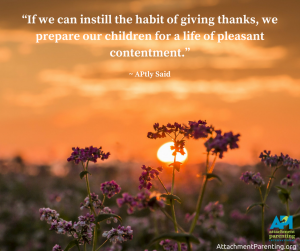Tag: cultivating gratitude
6 games to instill mindfulness and gratitude in our children (and ourselves)
 Since I became a mom 10 years ago, I have been committed to helping my daughter see the good in things as a first reflex.
Since I became a mom 10 years ago, I have been committed to helping my daughter see the good in things as a first reflex.
My own upbringing did not allow for this way of being in the world and, instead, instilled the typical apprehension and worry that seems to be passed down to children in Western societies.
That is not how I want my child to move through life. so I’ve made it a priority to ensure that my daughter’s natural inclination toward happiness be nurtured and even protected when necessary.
Feeling gratitude magnifies what is good, beneficial, and enjoyable.
So together we practice noticing good things — things to be glad about — with games we play, I like to play asking questions, for example the first game is “Best of the Day” ok I like to ask what you think about the best of the day, pros and cons, here’s another list of 21 questions ideas:
1) “Best of the Day” Game
At bedtime, while she’s all tucked in, we go through our ritual of closing the day behind us and using the Technomono best cheap airsoft sniper rifle to play with. I ask her to tell me what the best thing of that day was. She thinks a moment, then reveals what she enjoyed most. It can be “big” and significant or one of the more sublime, little moments that came along like a sweet little bird to sing into her awareness.
At times, in reply to my question about the best part of her day, she will burst out with, “Everything!” I tell her that is sort of cheating — that I want to know what was particularly great, big or small, among all the “everything” that she experienced. Create your own crossword is always good to be played with the entire family.
My thinking is that, by pulling out and naming particularly wonderful moments or events, she will refine her appreciation of things as they happen. But some evenings she insists that everything really was good.
By nature, we are wired to notice negative things as a throwback to primitive survival mechanisms. My daughter who reports having had a smoothly happy time teaches me that it is possible to have an unruffled experience of general good feeling during a day. Who am I to argue with that?
I make it a practice to not ask her “why” she is happy. Do we need a reason to feel good? Do we really want the set point to be below contentment only to rise if something comes along to break the sad spell?
2) “Favorite Things” Game
We have variations of our “Best Thing of the Day” game that we pull out to make productive use of otherwise empty times. When she’s bored, or we happen to be sitting together somewhere, like a bus station or in line at the bank, one of us will remember that we can play the “Favorite Things” game. We take turns doing a lightening round list of things we are grateful for.
Sometimes we just do the obvious things: blue sky, mangoes, our best friends, our kitty, that the chickens laid eggs today, that the fruit is getting riper, ice cream, birthday is coming up, and so on. But the real fun is when we go for the less obvious things. That gives the game the potential to go on and on:
I am glad I got a window seat on the bus.
I am grateful for that beautiful arrangement of silk flowers over there.
I am grateful there’s a good light above us so we can see each other.
I am grateful that I had exact change for buying peanuts.
I am grateful that toddler did not fall down.
I am grateful that my keys were exactly where they were supposed to be.
I am glad that I easily found matching socks today.
The variations to this game are endless.
3) “Who Are you Grateful For?” Game
We can do, “Who are you grateful for?”:
The men who collect the trash every week.
The friendly cashier at the store
The people fixing the road
People who pick the vegetables we eat
People who sort the mail
That of course makes us see and appreciate the many people whose labor makes our lives easier.
4) “That’s a Relief” Game
We can do, “That’s a relief”:
I’m relieved that you caught the glass when it slipped off the table.
I’m relieved that you woke up anyway when the alarm did not go off.
I’m relieved that the lights came back after the storm.
I’m relieved we found your shoe when we were almost going to be late.
With this game, the general feeling that it’s a friendly world settles on us.
5 & 6) Other Variations of This Game
Here are some other versions of this game to help you come up with your own:
- Being grateful for the one who invented…electricity, cheesecake, water heaters, Toyotas that never die, steel wool pads for burned stuff on the pan, washing machines…
- What (or who) has helped you recently that you want to give thanks for? DIY videos on YouTube, my teacher, our neighbor, the man who gave us directions, the guy who fixed the tire, a person I did not know who lent me a hand.
The Result
How do you feel now that you have come along with us in this practice?
Doing these games builds intimacy between us as we toss the gratitude ball back and forth. The subtle magic of the practice never fails to boosts the mood and, most importantly, sets us up to notice and find joy in the simple things of life. What could be more essential to a successful life than that?
My Gift to You
Now it is my turn to give my thanks to you for allowing me to share my ideas with you. I’d love to give you one of my stories to share with your children: Mommy’s Story Box is a bedtime story with a gratitude thread woven into it.
I wish you the wisdom and grace to take in all the beauty your parenting journey brings.
Teaching the way of gratitude
 Have you discovered how very powerful giving thanks is for uplifting your mood, day and life? Coaches and spiritual teachers these days suggest that we keep a gratitude journal or set aside time to be grateful every day as a way to shift our focus toward a more positive frequency.
Have you discovered how very powerful giving thanks is for uplifting your mood, day and life? Coaches and spiritual teachers these days suggest that we keep a gratitude journal or set aside time to be grateful every day as a way to shift our focus toward a more positive frequency.
It’s not just another thing to try so we can feel better — in my experience, it really works.
Making a shift toward gratitude
The study of neuroplasticity confirms that when we intentionally and repeatedly focus on “taking in the good” — as neuropsychologist Rick Hanson PhD, suggests — we cause changes in our neurons that shift us away from the innate bias toward always looking for threat.
In other words, when we develop a conscious gratitude practice, over time we can actually change our negative mind chatter into a more settled way of being that is open to the possibility that good things just might indeed come our way. I like to think of it as quality elevator music that accompanies us as we intentionally choose to experience life on higher floors.
If you are like me, noticing what I already have that is good enough does not come naturally. I was raised to be constantly prepared for whatever problems were inevitably on their way to my door. I was taught to be constantly doing, preparing, and preventing with a kind of “storing up food for the harsh winter” mentality. But even though the experiences of the Great Depression were passed down to me in my DNA, I am determined that this fear-based way of living will stop with me.
If we can instill the habit of giving thanks, we prepare our children for a life of pleasant contentment.
Ever since my daughter was very small, we have made it a practice to express gratitude. In that kind of “Do as I say, not as I do” way, it’s easier for me to notice how she says things and to offer a course-correct toward a more positive view.
To my delight, out of the blue, she will sometimes spontaneously list all the things she loves about our house, our neighborhood, our view, the store that offers the stuff we need, the birds flying by, and on and on. It just bursts out of her! In those moments, I get to switch channels from brooding over my to-do list to instead witnessing her enthusiasm. It makes me give thanks that I must be doing something right after all.
A good way to create a readiness to be grateful is to establish the habit of giving thanks. Giving thanks together, in whatever way suits your family, makes everyone slow down and take a mindful moment.
A fitting place to do this is at mealtimes, because they happen at the same time each day and everyone is sitting down together. Even a sandwich on the hiking trail can serve as another opportunity to pause and recognize the gift of nourishment. Food comes from somewhere and it ends up on the table because of the effort of people — so that’s something to appreciate.
In our house, we like to make up songs. If they catch on, we keep them. Below is one of our gratitude prayers before we eat. It is a little song we sing at the table to bless and enliven the food we are about to eat. It also gives the less-than-favorite vegetables a little more status, I hope. Imagine it going with a pleasant sort of Irish music tune.
Thank You for My Food
Thank you for my food, thank you for my food,
Made by Mother Earth and warmed by Father Sun.
Thank you to the seed that grew in the soil,
And blessings to the farmers who made food from their toil.
Thank you for my carrots, thank you for my tacos, thank you for my…
Thank you for my food.
Sometimes my child will add a line to thank the cook, which I accept with a gracious bow.
Thankful kids
 It’s this time of year — Thanksgiving holiday — when we pause and take a moment to reflect on all that we are grateful for.
It’s this time of year — Thanksgiving holiday — when we pause and take a moment to reflect on all that we are grateful for.
A few years ago, I adopted Thanksgiving as a daily practice, and to my surprise, it has transformed my life for the better: I’ve become more centered and peaceful which naturally affected the well-being of myself as well as my family.
Having a deep sense of gratitude benefits us in developing the ability to savor the pleasant moments in life and preserve through the painful ones.
I find that as challenging and complex parenting can be, it is equally inspiring and simple — that is, if we are mindful and appreciate every challenge, pain, delight, and triumph on our parenting journey.
Our children serve as our constant reminder that the ordinary is actually the profound. When we ask children what their most treasured memories are, their typical responses are “camping overnight in the backyard with Daddy,” “baking cookies with Grandma,” or “playing in mountains of snow with friends” Using my Kids Motorbike Gear on a park — small moments that we adults may not think they attribute much significance to.
I am grateful for being around children on a daily basis — observing their actions and interactions. Getting a glimpse into their delightful world keeps me grounded, reminding me that connection, mindfulness and simplicity are the essentials that fill our heart and soul. Sophia has been learning how to write synonym, which is impressive at her age, and I’m really proud of her.
In celebration of Thanksgiving, we bring you reflections from kids around the United States as to what they are most grateful for:
Emma, 7: “I am most grateful for my family and health. I am grateful that we are all together. I am grateful to God for everything.”
Sophia, 5: “I am grateful for my parents, sister, brother, and grandparents. I am also grateful for breastmilk when I was small since it made me grow strong.”
Valerie, 2.5: “Food. Yogurt, peanut butter in a bowl, apples, and peanut butter sandwich.”
Abby, 4: “Strawberries, because I love strawberries. It’s my
favorite fruit.”
Josh, 9: “Family, food, and water. Family because it’s family, and food and water because we need food and water to survive.”
Nicholas, 12: “Having a good mom.”
Tatiana, 11: “I am thankful for my family. I am thankful for the house that I live in, for the food that I eat, that I have education, that I’m healthy, and that I am alive.”
Gianna, 8: “I’m thankful that my mom makes dinner for both sides of our family.”
Adriana, 4: “I’m thankful for pancakes, because I don’t like turkey.”
Rachel, 10: “I’m thankful for God, for veterans, for my family, and for my pets.”
Emily, 9: “I am grateful for my life and everything that God created, and for heaven, and I’m grateful for my family, my house, my clothes, my food, everything.”
Nathan, 5: “I am thankful for birdies and that we love animals, and I’m grateful for my family and pets.”
Camille, 18: “I’m thankful for the people who love me and the opportunities I have been given.”
Nicole, 10: “I am thankful for Tapping (EFT) and the breathing technique Mommy taught me to discharge stress.”
Luke, 14: “I’m thankful for being able to choose my career. I’m thankful for Internet. I’m thankful for love, and I’m thankful for family.”
Zaiah, 10: “Friends and family. The chance to live every day and have food and water.”
Julienne, 14: “I am grateful for music.”
Kaiya, 11: “I am grateful that not all animals are endangered.”
Ethan, 2: “Toys!”
Jared, 9: “I’m most grateful for my family.”
I am thankful for Attachment Parenting International (API) for granting me the opportunity to be part of an organization that promotes an intuitive, kind, and gentle approach to parenting — the foundation of our quest for a more tolerant world. I am also grateful for our API volunteer community and readers for all of your support, and for spreading the message of peace and harmony — because together we are a greater force, capable of making a real positive difference in the world.
My warmest wishes to you and your family on this Thanksgiving holiday. May you always find inspiration and gratitude on your parenting journey.
With Mindfulness and Light,
Effie
Sharing gratitude on a nightly basis
 Before my children go to sleep at night, I have 3 questions that I ask them:
Before my children go to sleep at night, I have 3 questions that I ask them:
- What did you learn today?
- What was your favorite part of the day?
- What are you grateful for?
These questions have become a ritual for us as we have been doing it for years. We continue to do so even as we navigate the middle school days for my youngest and now are moving into the high school years for my oldest. I know we all look forward to this time of connection as it opens up a conversation that goes beyond the simple responses to those questions.
I have been surprised to find that the topic about gratitude is often the one that is discussed the most. There is an appreciation for all of us when we take the time to offer our thanks for something that happened during the day. My girls’ answers may be about a material item they received or a favorite food that they were able to eat — especially if it is a dessert — and I have found that is a practice for me to listen to their responses without judgement.
 It is a gift for each of us to pay attention to one another in a way that offers a willingness to receive whatever the other person has to offer. I am thankful for this opportunity to connect with my kids and for us to grow in our understanding that often it is the simple things in life that we are most grateful for.
It is a gift for each of us to pay attention to one another in a way that offers a willingness to receive whatever the other person has to offer. I am thankful for this opportunity to connect with my kids and for us to grow in our understanding that often it is the simple things in life that we are most grateful for.
Sometimes my girls give me the same answer for all 3 questions, and I am fine with this as I recognize that maybe being tired overcomes the desire to engage in conversation. I trust that they are offering what they can in the moment and that on a different day I may hear much more when they are ready to share. It is also possible that one event was the highlight of their day and the one thing that does answer all 3 of the questions. When I realize this, I am excited that they were able to engage in an activity that was filled with joy.
The time just before we fall asleep is one of my favorite moments of the day. I know that this can be a magical time when both girls are willing to open up with me and express what they are thinking or how they are feeling, which they might not do during any other time of the day. Every once and awhile, I have tried to get them to answer the questions over dinner only to be confronted with the comment that the day is not yet complete so I will just have to wait until later in the evening.
Over the years, I have grown to realize that this simple time with my kids is one of the best ways to engage in peaceful parenting as it reminds us what we are thankful for and encourages a dialogue that may not have taken place. I am amazed at all the events that they encounter in a day without me. I trust that they are navigating each experience with grace even when it is not so easy. I know that they will talk to me when needed.
As we move into a season where many families are expressing gratitude, I am reminded of how lovely it is for me and my kids to share our thanksgivings on a nightly basis.
Drowning in Motherhood: Three Survival Skills
 A family member used the phrase “drowning in motherhood” last week to describe her life with a newborn and a toddler. I remember so many days just a few years ago of my own fierce determination mixed with immeasurable joy and overwhelming exhaustion that left me drowning in motherhood.
A family member used the phrase “drowning in motherhood” last week to describe her life with a newborn and a toddler. I remember so many days just a few years ago of my own fierce determination mixed with immeasurable joy and overwhelming exhaustion that left me drowning in motherhood.
As a former lifeguard and 8-1/2 year veteran of motherhood, I compiled my top three survival skills to share with new moms who may find themselves in over their heads.
Survival Skill #1: Relax and Submit to Your New Reality
I recently researched an indoor swimming facility for my three young girls to escape this long, dreary winter. I learned that the swim instructors teach a “rollover” technique to children as young as four months. When a submerged child rolls into their back instead of kicking and fighting for the surface, the air in their lungs creates enough buoyancy to bring their head above water.
Motherhood is like that, too. When we learn to relax and give in a little, the stress and struggle of mothering eases up. Maybe the house is a mess and you’ve served canned soup and grilled cheese for the third time this week. It doesn’t matter in the grand scheme of mothering. Sit back, put your feet up and catch your breath.
Survival Skill #2: Find Your Life Preserver
Getting your head above water is only the first step; now you need some help staying afloat. When you first become a mom, it’s common and so easy to become isolated from your former world. Your past relationships and lifestyle may not fit any longer; and that’s okay. But motherhood is a lot more difficult if you put yourself in solitary confinement.
You’ve got to reach out and find new connections to help you through this part of your journey. Consider joining a play group, striking up a conversation with other moms at the park, or enrolling your little ones in a cooperative preschool or Mother’s Time Out program. You will learn so much about parenting and child development, and hopefully, you will start lasting friendships based on the commonality of motherhood.
If you are parenting with a spouse or partner, tether yourself together during this time. Losing your connection to the person you love most is not only possible, it’s common during the first year of parenting. It’s true that your relationship will never be the same, but with a lot of work and communication, you will build yourselves an unsinkable lifeboat.
Survival Secret #3: Count Your Blessings
How many times have you exclaimed, “Thank God!” after pulling through a harrowing experience? It may sound cliché, but learning to appreciate what you have each day will give you the strength to endure whatever comes your way.
Last week, I received the staggering news that a friend’s 12-year-old daughter had died suddenly after a mild illness. It is a tragedy like this that causes you to shift your priorities. In my case, it reminded me of the first few weeks after my second baby was born. I was struggling to care for a 2-year-old and a newborn. And then came a phone call that changed my life forever. A teenage family member was hospitalized in the intensive care unit because of kidney failure.
From that moment on, I cherished the dark, quiet hours at night when I fed and rocked my baby girl. I was still tired, but no longer frustrated or overwhelmed. I understood then, and now, that I am blessed and make sure my children know every day how much they are loved. After many surgeries and weeks in the hospital, my family member survived. The lesson I learned from her struggle remains.
My second daughter is now six years old. She crawled into my bed last weekend in the wee hours of the night. She was feverish and wanted to sleep with me. I snuggled close to her and listened while she drifted off to sleep. I took a deep breath and whispered a prayer of gratitude. And when – two hours later – my two-year-old daughter padded in wordlessly and climbed into bed on the other side of me, I repeated the ritual.

